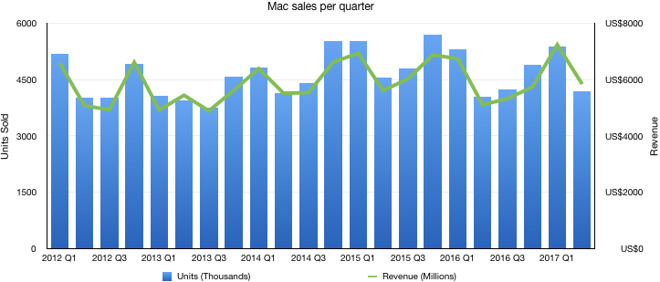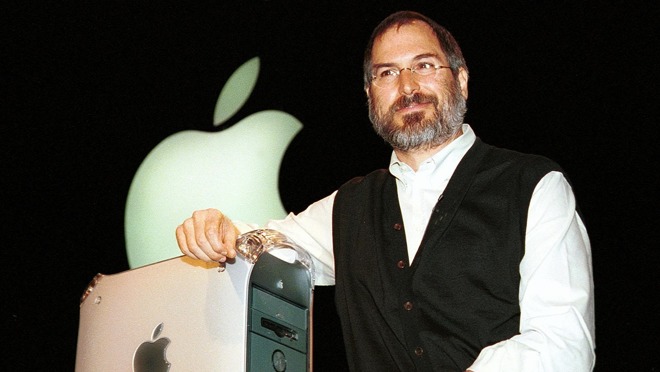In Tuesday's Apple earnings conference call, Apple Chief Executive Tim Cook declared that the company was "investing aggressively" in the Mac, signaling that meaningful refreshes are in the pike for years to come.

"Revenue grew 14 percent to a new March quarter record and gained market share thanks to strong demand for our new MacBook Pros," Cook said early in the call. "Our Mac business has generated over $25 billion in revenue over the past four quarters. We're investing aggressively in its future and we are very excited about the innovation we can bring to the platform."
Apple noted that it sold 4.2 million Macs, up 4 percent from the year-ago quarter, in a market that isn't growing. Specifically, the MacBook Pro sales grew the company's portable growth by 10 percent, more than twice the expansion of the category industry-wide.
Apple's Mac growth isn't limited to the U.S. While Apple may be not reaching its lofty peaks it hit shortly after arriving in country with the iPhone, Mac revenue growth is up 20 percent in China.
A new line of pro hardware is coming

Presumably, Cook and company is referring at least in part to the renaissance of the Mac Pro, and associated ecosystem. In early April, the company revealed that the Mac Pro will be resurrected with an entirely new design, and that Apple-branded professional displays are also in the product pipeline.
Coupled with that, Apple has promised the iMac will be refreshed later this year. The rumored "server-grade" iMac reportedly sports the Xeon E3-1285 processor, between 16 and 64 gigabytes of ECC RAM, up to 2TB of NVMe SSE storage, and the "latest" discrete GPU.
The MacBook Pro is the most recent Mac model to be refreshed. It isn't clear when it will see an update again -- Apple may wait until Intel's Cannon Lake processor for an update, with its support of LPDDR4 RAM allowing for 32 gigabytes of RAM without resorting to power-hungry desktop RAM.
Consumer-oriented Macs have a less clear path
Also labeled as important by Apple exectives is the Mac mini. The diminutive Mac is an "important" product and won't be cancelled anytime soon, according to Apple marketing chief Phil Schiller.
That said, the Mac mini hasn't been updated since October 2014, and that model has been criticized as being less powerful than the 2012 model.
Apple's 12-inch MacBook with Retina display debuted in 2015. It was last updated in April 2016 with a new family of Intel processors based on the Skylake architecture.
The MacBook Air remains in the product line -- but perhaps only for now. It had a minor shuffling during the launch of the new MacBook Pro in 2016. It hasn't been notably upgraded since 2015, and it appears that the 12-inch MacBook and Touch Bar-less MacBook Pro are the heirs apparent to the market segment occupied by the MacBook Air.
Sometimes, you still need a truck
Apple's market is flush will all manners of users up and down the scale, from people who use the device just to get email, all the way to Hollywood video editors, architects, and other users with computational demanding needs. It can be argued that the former is a larger class than the latter, as perhaps evidenced by the lack of attention to the Mac Pro, and sporadic updates to the MacBook Pro, in recent years.
However, beyond just production needs, the Mac is still needed for iOS coding. The iOS App Store doesn't exist without the Mac, at least for now. The only sign that Apple is even considering porting Xcode to iOS is Swift Playgrounds -- and that's not much of a move in the direction.
It's not clear why Apple waited on the MacBook Pro. Perhaps Intel's only minor generational improvements between generations of the Core processor weren't compelling enough, and perhaps Cook and company had other reasons -- which will never be told.
Perhaps Cook's commitments about the Mac in the latest conference call, and Apple's latest statements on the matter, may encourage the Mac faithful.